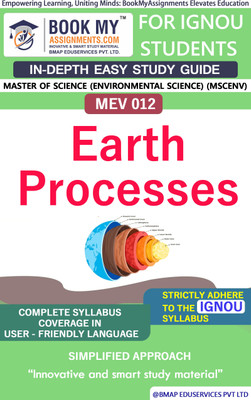IGNOU MEV 12 Earth Processes Study Guide (In Depth Guide) for Ignou Student(Paperback, BMA Publication)
Quick Overview
Product Price Comparison
IGNOU's MEV 12 (Earth Processes) course involves exploring various geological processes that shape the Earth's surface and interior. Here's an in-depth guide to help you excel in your studies:Review the Syllabus: Begin by thoroughly reviewing the syllabus provided by IGNOU for the MEV 12 course. This will give you an overview of the topics you need to cover and the structure of the course.Study Material: Utilize the study materials provided by IGNOU for the course. These materials typically cover fundamental concepts in Earth processes, including plate tectonics, geomorphology, weathering, erosion, and sedimentation.Textbooks and References: Supplement your study materials with textbooks and reference books on geology and Earth sciences. Some recommended textbooks include "Physical Geology" by Charles C. Plummer, "Earth: Portrait of a Planet" by Stephen Marshak, and "Principles of Geology" by Charles Lyell.Understanding Geological Processes: Earth processes encompass a wide range of geological phenomena, including the formation of mountains, earthquakes, volcanic eruptions, erosion by water and wind, deposition of sediments, and the movement of glaciers. Make sure you have a basic understanding of these processes and their significance.Plate Tectonics: Study the theory of plate tectonics, which explains the movement of the Earth's lithospheric plates and their interactions at plate boundaries. Understand how plate tectonics contributes to the formation of mountains, earthquakes, and volcanic activity.Landforms and Geomorphology: Explore different landforms and their formation processes, such as mountains, valleys, plains, rivers, glaciers, and coastlines. Understand the role of erosion, weathering, and deposition in shaping the Earth's surface.Rock Cycle: Study the rock cycle, which describes the processes by which rocks are formed, transformed, and recycled within the Earth's crust. Learn about the three main types of rocksŌĆöigneous, sedimentary, and metamorphicŌĆöand their formation processes.Natural Hazards: Explore natural hazards such as earthquakes, volcanic eruptions, landslides, floods, and tsunamis. Understand the causes, impacts, and mitigation measures associated with these hazards.Environmental Geology: Investigate the interactions between human activities and geological processes, including issues related to land use planning, resource management, geological hazards, and environmental conservation.


